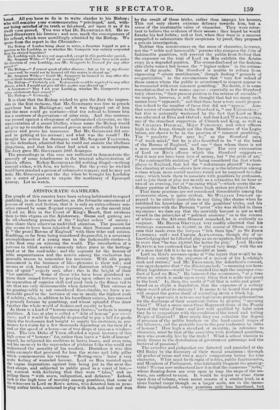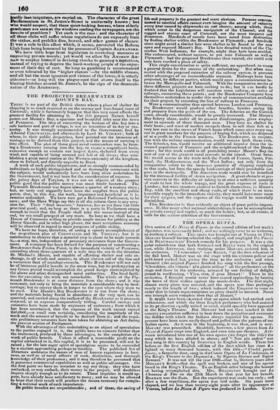ARISTOCRATIC GAMBLERS.
THE people of this country have been so long habituated to regard gambling, in one form or another, as the favourite amusement of
persons of rank and fashion, that it is only an extraordinary sen- sation caused by some flagrant exposure, such as the recent trial of Lord DE Ros in the Court of King's Bench, that awakens them to this stigma on the Aristocracy. Game and gaming are the all-absorbing pursuits of the " higher orders" of society : these share their otherwise undivided attention. The passion for play scents to have been inherited from their Norman ancestors by " the proud Barons of England " with their titles and estates. Gambling, so far from being considered disgraceful, is a necessary accomplishment of a young man in the fashionable circles—it is the first step on entering the world. The introduction of a parvenu to titled society commonly takes place in the betting- stand or at the card-table : and the aspirant for the honour of noble acquaintances and the entree among the exclusives has generally reason to remember his noviciate. With idle people amusement is the business of life—pleasure is their toil ; and success or risk beyond others is the distinction which " young men of spirit" eagerly seek after : this is the height of their "low ambition." Some of those who have been plundered re- trieve their ruined fortunes by preying upon others in turn; and the reputation of superior skill and good luck is the flimsy veil to arts that are only dishonourable when detected. That success at the gaming-table is not considered discreditable, we have a re- markable proof in the instance of one in nearly the highest rank of nobility, who, in addition to his hereditary estates, has amassed a princely fortune by gambling, and whose splendid ttetes draw together the whole world of fashion and royalty to boot. As there is a kind of "honour among thieves," so there is among gamblers. A loss at play is called a " debt of honour" pia• creel- leave; and it would be thought disgraceful to pay a bill for goods which the tradesman had bought to supply his customer, in pre- ference to a claim for a few thousands depending on the turn of a card or the speed of a horse—or of two drops of rain on a window- pane. The late Duke of Yoeic afforded a signal instance of this high sense of " honour :" for, rather than leave a " debt of honour" unpaid, lie subjected his creditors to heavy losses, and even ruin, and his memory to the reproaches of plebeian folks who could not understand the morality of his conduct. Doubtless it was this noble example that procured for him the statue and lofty pillar which commemorate his virtues. " Betting-men " have a very acute feeling of wounded honour. Lord De Ros insisted upon the vague imputations against him being put in the most dis- tinct shape, and subjected to public proof in a court of law,— not content with declaring that they were " false," and re- pelling them " with scorn, indignation, and defiance." Indeed, such is the high tone of morality among gamblers, that some of the witnesses in Lord roe Ross action, who detected him in prac- tising unfair tricks, continued to play with him, and lost and won
by the result of' these tricks, rather than impugn his honour,. This not only shows extreme delicacy towards him. but a sense of the inestimable value of character. They were reluc- tant to believe the evidence of their senses : they hoped he would forsake his bad habits ; and at last, when they were in a manner compelled to substantiate their suspicions by proof, they proposed a private investigation.
Neither this sensitiveness on the score of character, however, nor the " noble and honourable" persons who compose the ate of fashionable gamblers, will prevent the public from feeling that the exposure on the trial of Lord DE Ros exhibits the Aristo- cracy in a degraded position. The scenes disclosed at the fashion.. able clubs cannot but lessen the " higher orders" in the estima- tion of the people. The Standard is unable to refrain from expressing " severe mortification," though finding " grounds of congratulation " in the circumstance that " very few indeed of those names whom the public is accustomed to respect appear to
be connected with even innocent gambling." No doubt, it is some
consolation that so few names appear ; especially as the Standard truly observes, " their present position is the reverse of enviable:" we suspect, however, it will be thought that but too ninny such names have " appeared ;" and that these bear a very small propor- tion indeed to the number of those that did not " appear." Ano- ther source of consolation to the Standard is," our Universities:" but this is unhappily weakened by the fact that Lord DE Ros was educated at Eton and Oxford; and that Lord WHARNCLIFFE, one of the stanchest supporters of Church and King, as well as Slr• CHARLES DALBIAC, Harr FANCOCRT, and other officers high in the Army, though not like them Members of the Legis- lature, are shown to be in the practice of " innocent gambling." The " paralytic Peer may be," as the Standard says, " of weak mind;" but he is also described to be " at the head of the Barons of England," and one " than whom there is not a more accomplished man in Europe." The very extenuation of Lord ne Ros's offence which the Standard suggests— that it may not have been love of money, but " the pride of art," " the contemptible ambition " of being considered the first whist- player in England, that led the " unfortunate plaintiff" to prac- tise cheating at cards—shows how strong is the infatuation among a class whom more sordid motives would not be supposed to influ- ence ; which leads them to associate with gamblers by profession, and to join them at play not merely as a relaxation for an hour or two of an evening, but at " morning whist"—which seems the or- dinary pastime at the Clubs, where high stakes are played for. That these practises are not considered discreditable among the aristocratic class, is quite evident. Sir WI welt INGILBY ap- peared to be utterly insensible to any thing like shame when he exhibited his knowledge of one of the gamblers' tricks, and his acquaintance with the Parisian "artist " who was skilled in these ' mysteries : we dare say that the unwieldy baronet is not so well versed in the principles of " political economy" as in the science of whist—as the Attorney•General remarked, he is evidently no conjurer. Mr. BROOK GREVILLE very readily admitted that his winnings amounted to 33,000/. in the course of fifteen years—a sum that made even the lawyers " lick their lips," as Sir JOHN CAMPBELL said : and Captain ALEXA.NDER, though shy of ac- knowledging that lie followed play as an occupation, did not scruple to avow that "he was 10,0001. the better for play." Lord HENRY BENTINCK too confessed that he " played very deep,' with the air of a man that felt it to be no discredit at least.
Lord DE Ros's accusers spoke of " the injury that would be in- flicted on society by the exposure of a person of his Lordehip's rank and station ;" and Mr. THES,4GER, the defendants counsel, was apprehensive that " the illustrious body "—meaning our here- ditary legislators—would be "wounded through the improper con- ' duct of Lord DE Ros." lie lamented the occurrence, " at a time when an attack is made upon every thing that is noble and great in the land." Is, then, the credit of "all that is noble and great based on so slight a foundation that the exposure of a solitary cheat would a&ct its stability ? It seems to be feared that people will suspect the easier itself of encircling rainy a black leg. , What a spectacle it is to see our legislators preparing themselves for the discharge of their senatorial duties by playin:r, " morning whist!" What a sense meet these Representatives of the People have of the value of time : and how' well qualified by habit must ' they be to sympathize with the condition of the taxed and toiling People of England ! How nicely they can calculate the degree of pressure of the public burdens on the hard-earned wages of the labourer, and the probable loss to the poor tradesmen by debts
• of honour ! glow high a standard of morality, in reference to character, must'be that of the associates with professed gamblers, men who avowedly live by the trade ! What a school wherein to study fitness in the distribution of government patronage and the bestowal of pensions! The swindler and pickpocket are detected and punished at the Old Bailey by the discovery of their• rascal associates : through all grades of crime and vice a man's companions betray his true character. What must be thought of nobles, public functionaries, ' and Members of Parliament, who habitually frequent the gaming- , table? We can now understand how it is that the numerous " hells," whose flaming doors are ever open to trap the steps of the un- wary, are suffered to exist. It would be unjust to close these open dens of infamy, when secret resorts of a similar kind, in a more limited range though on a larger scale, are in the imme- diate neighbourhood, where practices only less barefaced, but
hastily less iniquitous, are carried on. The character of the great Pnndernoniurn m St. James's Street is universally known ; but who would suspect, that these quiet-looking houses, where elderly gentlemen are seen at the windows reading the newspapers, are the haunts of gamblers ? Yet such is the case : and the character of all those clubs will suffer whose regulations do not expressly limit the stakes, and prohibit dice, hazard, and other games of chance. It was a rule to this effect which, it seems, prevented the Reform Club from being honoured by the presenceof Captain ALEXANDER.
We have little hope from legislation in correcting manners or improving private morals; yet would we allow Sir ANDREW AG.
to employ himself in devising checks to gaming ttmptations, instead of trying to deprive the hard-working people of the enjoy- ment of their day of rest. So long as gambling is countenanced or even tolerated by the "higher classes"—by the middle classes, and all but the most ignorant and vicious of the lower, it is utterly abhorred—so long will the plague-spot that shows itself in the blazing blotches around St. James's, be the sign of the demorali- zation of the Aristocracy.



























 Previous page
Previous page